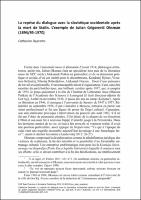Chapter La reprise du dialogue avec la slavistique occidentale après la mort de Stalin. L’exemple de Julian Grigorevič Oksman (1894/95-1970)
| dc.contributor.author | Catherine, Depretto | |
| dc.date.accessioned | 2022-06-01T12:07:17Z | |
| dc.date.available | 2022-06-01T12:07:17Z | |
| dc.date.issued | 2017 | |
| dc.identifier | ONIX_20220601_9788864535074_33 | |
| dc.identifier.issn | 2612-7679 | |
| dc.identifier.uri | https://library.oapen.org/handle/20.500.12657/55850 | |
| dc.description.abstract | Prominent historian of Russian literature, one of the best pushkinists of his time, Ju. Oksman was sent to a camp in Kolyma in 1936. Upon his release in 1947, he found a position at Saratov University, then he moved to the Institute of World Literature a decade later. Because of his anti-stalinism, he was fired from his academic positions in 1964 and until the perestroika it was forbidden to write about him in USSR. His letters to Ludwig Domherr or Gleb Struve provide a rich material of the scholar’s determination to revive the dialogue with the West and a testimony of his courageous position. | |
| dc.language | French | |
| dc.relation.ispartofseries | Biblioteca di Studi Slavistici | |
| dc.subject.other | Julian Oksman | |
| dc.subject.other | Gleb Struve | |
| dc.subject.other | Ludwig Domherr | |
| dc.subject.other | Destalinization | |
| dc.title | Chapter La reprise du dialogue avec la slavistique occidentale après la mort de Stalin. L’exemple de Julian Grigorevič Oksman (1894/95-1970) | |
| dc.type | chapter | |
| oapen.identifier.doi | 10.36253/978-88-6453-507-4.23 | |
| oapen.relation.isPublishedBy | bf65d21a-78e5-4ba2-983a-dbfa90962870 | |
| oapen.relation.isbn | 9788864535074 | |
| oapen.series.number | 36 | |
| oapen.pages | 13 | |
| oapen.place.publication | Florence |

